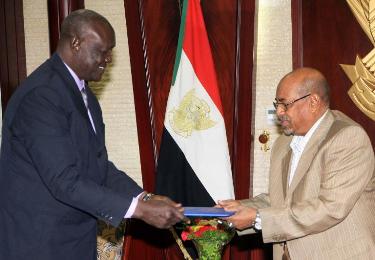South Sudan defence minister hails outcomes of bilateral meeting with Sudan
June 6, 2016 (JUBA) – South Sudanese defence minister, Kuol Manyang Juuk, has described as “cordial and fruitful” bilateral meetings for which he led a high level government delegation from his country to neighbouring Sudan on Saturday which resulted to activating common border buffer zones between the two countries.

The two countries in September 2012 signed a number of agreements, duped as Cooperation Agreements, as a roadmap for relations between them after their 2011 split.
The cooperation agreements could not be implemented for over years since signing and the two countries continued to accuse each other of supporting rebels hostile to the either.
But Juuk said the different level of meetings involving the two parties had reached the consensus during their extensive talks in Khartoum on Sunday to concentrate on how to build and strengthen the relationship by identifying areas of concerns and to try as quickly as possible to address issues through joint political and security mechanisms.
During the talks in Khartoum officials from both sides hailed their efforts and regarded them as efforts of “brothers sharing wealth and woe as well as becoming good friends supporting each other and good partners pursuing common development.”
The top defence official said neither Sudan nor South Sudan would live without the support of the other, explaining that the two countries share a lot in common.
“South Sudan stands ready to deepen and expand friendly and reciprocal cooperation with Sudan in various areas within the framework of the cooperation agreement to better benefit the people of the two countries,” said Juuk.
“South Sudan will never cease to be a neighbour to Sudan and the same for Sudan. Apart from being neighbours, we also share a lot in common. Our history was one and still we have other common heritage, including some cultures, languages and marriage,” he explained.
During the latest meeting the two countries at the level of foreign affairs and defence agreed to enhance cooperation not only on security matters and trade but also on agricultural modernization and strengthen infrastructure.
“All our meetings at various levels went well and were successful. We agreed to continue to plan and advance bilateral ties from a strategic and long-term perspective, and understand and support each other on issues involving our core interests and major concerns,” he said, calling for closer interactions between governmental organs, ruling parties, legislatures, and armed forces of the two countries.
According to a joint statement on establishing the partnership, the two countries agreed to not provide any kind of support, including hosting, providing of training camps and other military and political support to any hostile group operating with an ambition to destabilize and try to remove from the power through unconstitutional means government of either of the two countries.
They agreed to firmly enhance efforts aimed at safeguarding national security and stability as well as resist interference from outside.
The two countries also agreed to push to improve their national defence and ability to maintain stability.
Sudanese authorities have agreed to support all of the South Sudanese government’s efforts to realize peaceful development of cross border relations and peaceful coexistence between communities.
The Sunday decision to activate the security clause in the September 2012 cooperation agreements came two days after the South Sudanese Presidency reaffirmed the need to implement the cooperation agreements.
In their Friday’s meeting with participation of President Salva Kiir, First Vice President, Riek Machar and Vice President, James Wani, the Presidency decided to put the office of the First Vice President, Machar, in charge of the file for the cooperation agreements with Sudan.
The responsibility of the First Vice President involves giving directives and supervision to the various committees and officials tasked with the implementation of the agreements.
(ST)
